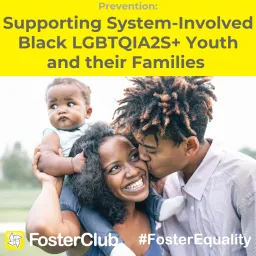Black youth and youth who are LGBTQIA2S+ are both overrepresented in the foster care system, and Black families on average experience higher levels of involvement in the child welfare system than White families.
Here are a few recommendations for child welfare professionals to aid them in supporting Black families and Black LGBTQIA2S+ youth.
Advocate for policies and practices to support Black families and prevent unnecessary child removal.
- Ensure family preservation services are anti-biased, community-based and supportive of families.
- The Administration of Children and Families has some great resources for child welfare professionals on addressing implicit bias in their practice. View those resources here.
“There was blatant bias put forth by my advocacy team” – former foster youth from Arkansas
- One in four Black children in the U.S. live below the poverty line. Agencies should train community service and child welfare professionals to understand that living in poverty is not the same as child neglect.
- Here’s a resource from The Center for the Study of Social Policy on how we can better serve families living in poverty and prevent unnecessary child removal. View that resource here.
- Preventative legal advocacy programs are an evidence-based way to assess and eliminate poverty-related obstacles that can lead cause child welfare system involvement.
- Housing, for example, is one of the primary concerns of families living in poverty. Here is a resource explaining the link between unstable housing and child welfare involvement.
- This article explains the positive outcomes of differential response (DR) systems in investigating child neglect cases. DR systems provide alternatives to child removal including family engagement and links to supportive services.
Ensure legislators and judges understand the links between neglect cases and poverty, and encourage them to critically analyze the reasoning behind a child’s removal from their family.
- Providing research and data is the best way to promote equitable decision making among legislators and judges.
- Here is a systematic review of research exploring the links between poverty and child maltreatment.
- This policy and practice resource from 2010 addresses poverty as a major risk factor for child neglect.
For families who are unsupportive of LGBTQIA2S+ identities, family preservation agencies should provide family-centered counseling services that include education about the normative development of sexual orientation and gender identity in youth. This will decrease the chance of family rejection and entry into foster care.
- This is a best practice resource for counselors who work with families of LGBTQIA2S+ youth.
- Here is an overview of family-centered counseling interventions identified in the Family First Prevention Services Act. It discusses using these interventions in the context of “family diversity”, rejection, and exclusion.
For Black LGBTQIA2S+ youth in the foster care system, child welfare professionals should advocate for improved and safe SOGI (sexual orientation and gender identity) data collection at the federal and state levels.
- This will inform research, elevate gaps in services, and amplify disparities to the public, and ensure that LGBTQIA2S+ foster youth receive appropriate services and placement decisions.
- More information about the importance of SOGI data collection can be found here. Learn more about FosterClub’s SOGI data collection advocacy here.
These policy suggestions can improve the wellbeing of Black families and Black LGBTQIA2S+ youth involved in the child welfare system. For caseworkers, social workers, therapists, and other child welfare professionals, check out #FosterEquality’s resource on practice improvement strategies for Black LGBTQIA2S+ youth!
Sources:
Casey Family Programs. (2021). “How is preventative legal advocacy critical to the continuum of legal advocacy?”. https://www.casey.org/media/21.07-QFF-Legal_Preventative-legal-advocacy_...
Detlaff, A., Weber, K., Pendleton, M., Bettencourt, B., Burton, L. (2021). How We endUP: A Future Without Family Policing. upEND Movement.
Grooms, J. (2020). No home and no acceptance: Exploring the intersectionality of sexual/gender identities (LGBTQ) and race in the foster care system. The Review of Black Political Economy 47(2), 177-193. https://doi.org/10.1177/0034644620911381open_in_new
Padilla, C. Thomson, D. (2021). More than One in Four Latino and Black Households with Children Are Experiencing Three or More Hardships during COVID-19. Child Trends. https://www.childtrends.org/publications/more-than-one-in-four-latino-an...

